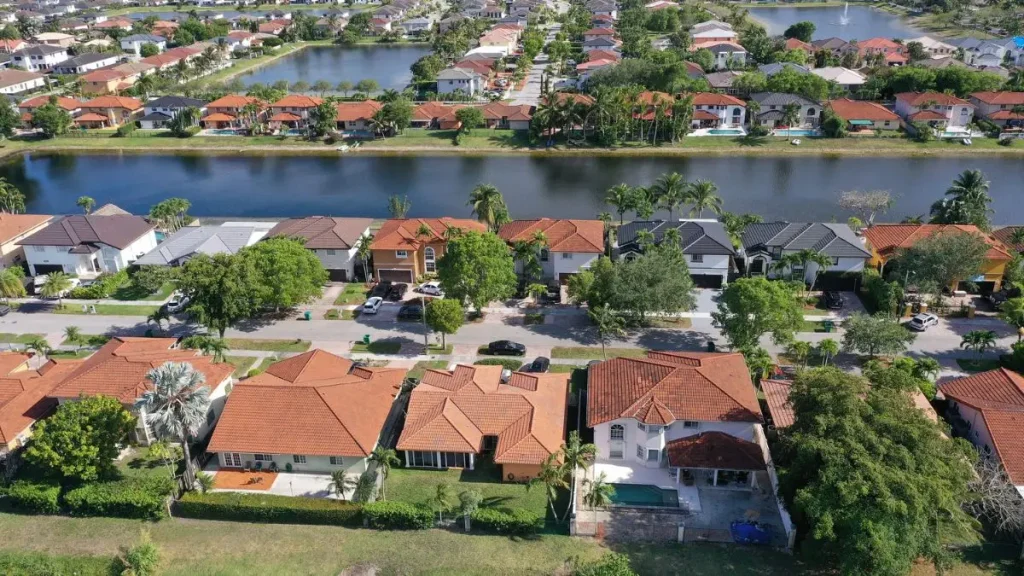Top Florida Cities Where Homes Are Sitting Unsold—Market Analysis 2025
Florida’s real estate market has entered a new phase—one defined by excess inventory, shifting buyer behavior, and intense competition among sellers. With thousands of homes now flooding the market, the dynamics of buying and selling in the Sunshine State are rapidly changing. Whether you’re a homeowner planning to sell or a buyer looking to enter the market, understanding this shift is critical.
While rising inventory may seem like a simple numbers game, it’s much more than that. The condition, security, and future-readiness of a home now play a huge role in making it stand out—or sit unsold. For both parties, it’s no longer just about timing. It’s about smart preparation, safe investment, and future-proofing your property for long-term value.
Florida’s Housing Inventory Surge: What the Numbers Say
In February 2025, Florida’s housing inventory hit a new milestone, with 168,717 active listings across the state—the highest number recorded since Realtor.com began tracking this data in 2016. This surge in inventory reflects a combination of market forces: high mortgage rates, longer days on the market, and sellers who are no longer holding out for peak pricing.
Some areas are seeing explosive growth in listings. St. Petersburg, for instance, experienced a jaw-dropping 164% increase in homes for sale year-over-year, while Citrus Springs and Miami Gardens also reported significant jumps. These figures aren’t isolated; they indicate a statewide trend that’s reshaping buyer and seller strategies.
According to Realtor, this dramatic growth in inventory is a sign that the market is balancing out after years of aggressive price growth and low availability. Florida, in particular, has outpaced much of the country, where the average inventory increase sits closer to 20–25% year-over-year. This means buyers have more choices—but sellers need to work harder to attract attention.
Top Florida Cities With the Fastest-Growing Home Listings

While the state as a whole is experiencing an inventory boost, some cities are seeing especially fast growth:
- St. Petersburg – +164% YoY
- Citrus Springs – Significant uptick in suburban development listings
- Miami Gardens – Inventory rise driven by new construction and slower sales
- Cape Coral & North Port – Suburban sprawl contributing to growing home counts
- Orlando Metro – Homes staying longer on the market, increasing supply
These locations are prime examples of how rising inventory doesn’t always mean falling prices, but it does mean more competition. For buyers, this is a golden opportunity to be selective. For sellers, it’s a signal to upgrade, stage well, and differentiate.
What This Means for Buyers
Buyers now have more leverage than they’ve had in years. With so many homes on the market, bidding wars are less common, and price negotiations are back on the table. However, the increased choice also means more homework is required.
Many homes are sitting unsold because they lack modern amenities or need updates. Buyers should focus on properties that may require minor home improvement but are priced accordingly—this opens up room for customization while staying within budget.
It’s also critical to assess neighborhood safety, proximity to schools and services, and existing home security systems. In a saturated market, smart buyers will not only think about the initial purchase but also about the long-term value and livability of their investment.
As we think about smart upgrades, don’t overlook the power of subtle elegance—this historic home’s hidden features show how discreet design can be timeless and highly practical.
Tips for First-Time Buyers in a Competitive Florida Market

If you’re buying a home in Florida for the first time, this high-inventory environment presents a rare opportunity—but also new challenges. With more homes available, the pressure to rush into a deal has eased. Still, the key is knowing how to spot the right property that offers both comfort and security.
Here are a few smart moves for new buyers:
- Don’t be dazzled by just the price a cheap home that needs major repairs can cost you more over time.
- Check the neighborhood thoroughly look into local crime rates, lighting, and proximity to essential services.
- Evaluate the home’s security features are there solid doors, working locks, or any surveillance systems? If not, these are things you should budget for post-purchase.
- Inspect beyond the surface look at roofing, electricals, and plumbing systems to ensure safety and functionality.
- Leave room in your budget for upgrades after closing, invest in basic home improvements like installing a smart security system, improving insulation, or updating outdated appliances.
First-time buyers who think long-term—and plan for upgrades after purchase—can secure a better deal and increase the value of their property faster.
What This Means for Sellers
For sellers, Florida’s ballooning inventory brings a harsh truth: it’s no longer enough to just list your home and wait. In 2025, your home has to compete—not just in price, but in condition, design, and perceived safety.
Here’s what sellers should take seriously:
- Curb appeal still matters a fresh coat of paint, clean landscaping, and welcoming lighting can set your home apart instantly.
- Stage your home for lifestyle, not just space buyers need to see how they’ll live there, not just how big the rooms are.
- Update key features where possible replacing old doorknobs, broken window locks, or dim lighting fixtures can make a difference.
- Invest in security upgrades smart doorbells, motion detectors, and even visible cameras can boost buyer confidence—especially in urban areas or regions with rising crime.
- Get pre-inspected a home that comes with a clean inspection report shows transparency and reduces buyer hesitation.
The bottom line? In a high-supply market, buyers will compare your home against dozens of others. The properties that feel safer, move-in ready, and modern will always win—often even at higher price points.
Why Smart Homes Sell Faster in 2025
With housing inventory at an all-time high, homes that stand out technologically have a clear edge. In today’s market, buyers are not just looking for a place to live—they’re looking for safety, convenience, and long-term efficiency. This is where smart home upgrades come into play.
Smart homes equipped with:
- Video doorbells
- App-controlled lighting and thermostats
- Smart locks and window sensors
- Integrated security systems with live monitoring
…are seen as more modern, secure, and ready for the future.
Even modest upgrades—like a smart thermostat or motion-sensor lights—can help your home sell faster and closer to asking price. According to multiple housing reports, listings that include smart tech in their descriptions are clicked on more frequently and often spend fewer days on the market.
For sellers, these upgrades are not just aesthetic—they send a message: “This home is safe, efficient, and ready for a modern lifestyle.”
How to Stand Out in a Crowded Market

With Florida homes flooding the market, competition is fierce. So how can your listing shine among thousands? Whether you’re buying or selling, the strategy is the same—focus on long-term value and visible improvements.
Here’s what can make a difference:
- Improve home energy efficiency: Installing LED lighting, adding insulation, or upgrading to Energy Star appliances can add appeal.
- Highlight security in your listing: Mention security features upfront—buyers often filter by this.
- Use high-quality visuals: Professional photos and video walk-throughs give you a competitive edge.
- Add affordable home care: Upgrades things like new water filtration, fire extinguishers, updated carbon monoxide detectors, or noise-proofing can significantly boost perceived value.
- Mention local advantages: If your home is in a low-crime zone, close to emergency services, or within a gated community—say so!
In a crowded market, buyers are not just looking at price—they’re looking for peace of mind. Whether it’s safety, reliability, or comfort, every added layer of value helps a home rise to the top of the list.
What Florida Homeowners Should Do Now
Whether you’re a buyer, seller, or just staying put, Florida’s shifting real estate landscape is a wake-up call to assess your home’s value—not just in terms of money, but safety and livability.
For current homeowners, now is a smart time to:
- Schedule a home security audit: Walk through your property with fresh eyes: Are there blind spots? Weak locks? Outdated alarm systems?
- Upgrade your home’s safety layers: Consider flood sensors (especially in hurricane zones), smart smoke detectors, or reinforced windows.
- Future-proof your space: Think about small improvements that add both comfort and resale value, like solar panels, backup power systems, or weatherproofing.
- Stay informed: Local housing trends, crime statistics, and neighborhood development plans can all affect your home’s future value.
Just because you’re not selling doesn’t mean you shouldn’t enhance and protect what you already own. A secure, upgraded home is always a smart investment—especially in uncertain markets.
Conclusion
Florida’s housing inventory surge is reshaping the way buyers and sellers interact with the market. While the number of available homes continues to rise, it’s no longer just about supply—it’s about value, safety, and readiness. Buyers want homes that are secure and future-proof. Sellers need to respond with upgrades that matter.
Whether you’re entering the market or staying in your current home, now is the time to focus on what really counts: smart improvements, strong security, and practical home care. In this competitive environment, homes that feel safe, efficient, and well-maintained will always stand out—no matter how crowded the market becomes.
Want to make your home safer and more valuable in today’s market? Visit our website for simple, actionable guides on home security, smart upgrades, and modern home care—all designed to help you build like new.
Disclaimer: This article is for informational purposes only. The content provided is based on publicly available data and market trends, including housing inventory data from Realtor.com as of February 2025. All recommendations are general suggestions and should not be considered financial, legal, or real estate advice. Always consult a licensed professional before making significant property decisions.


